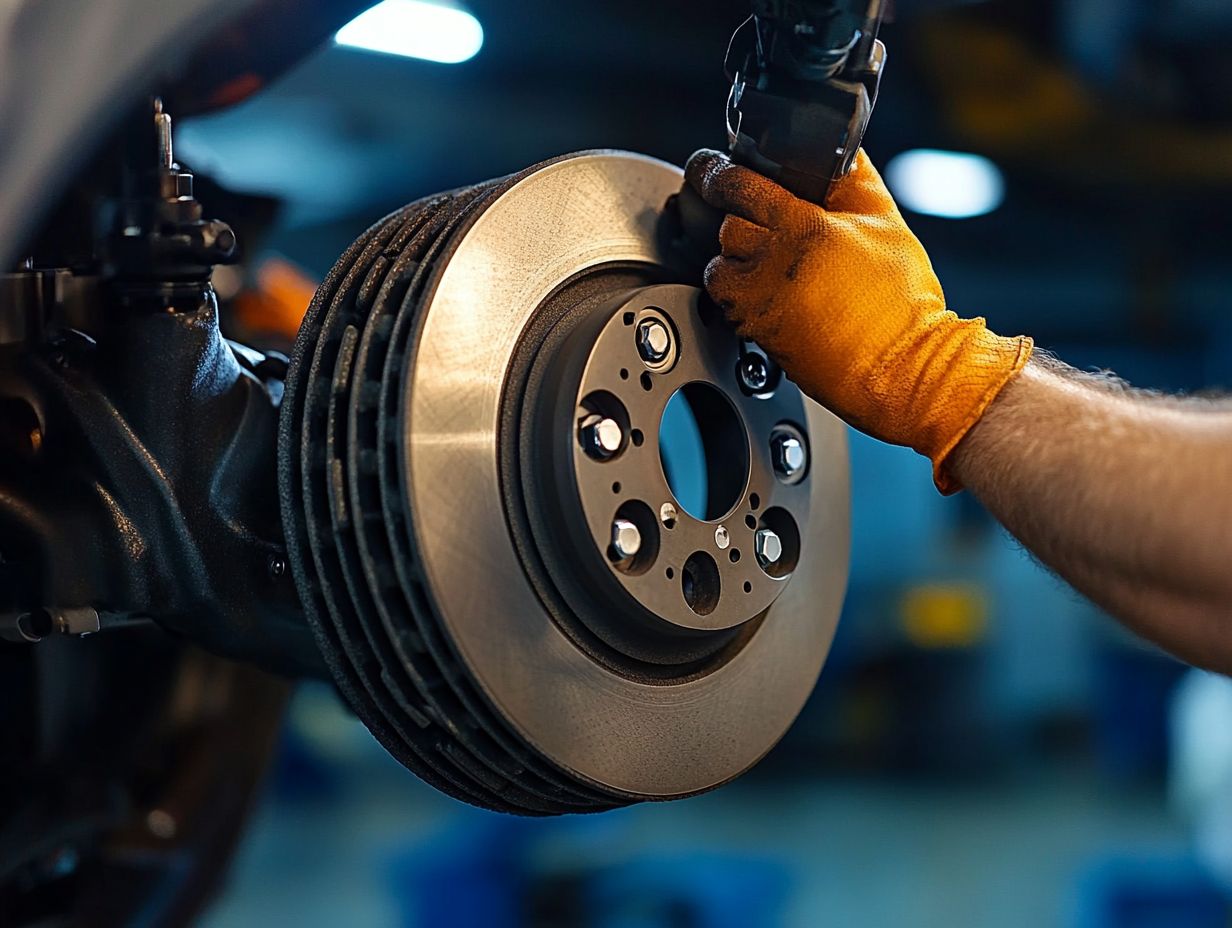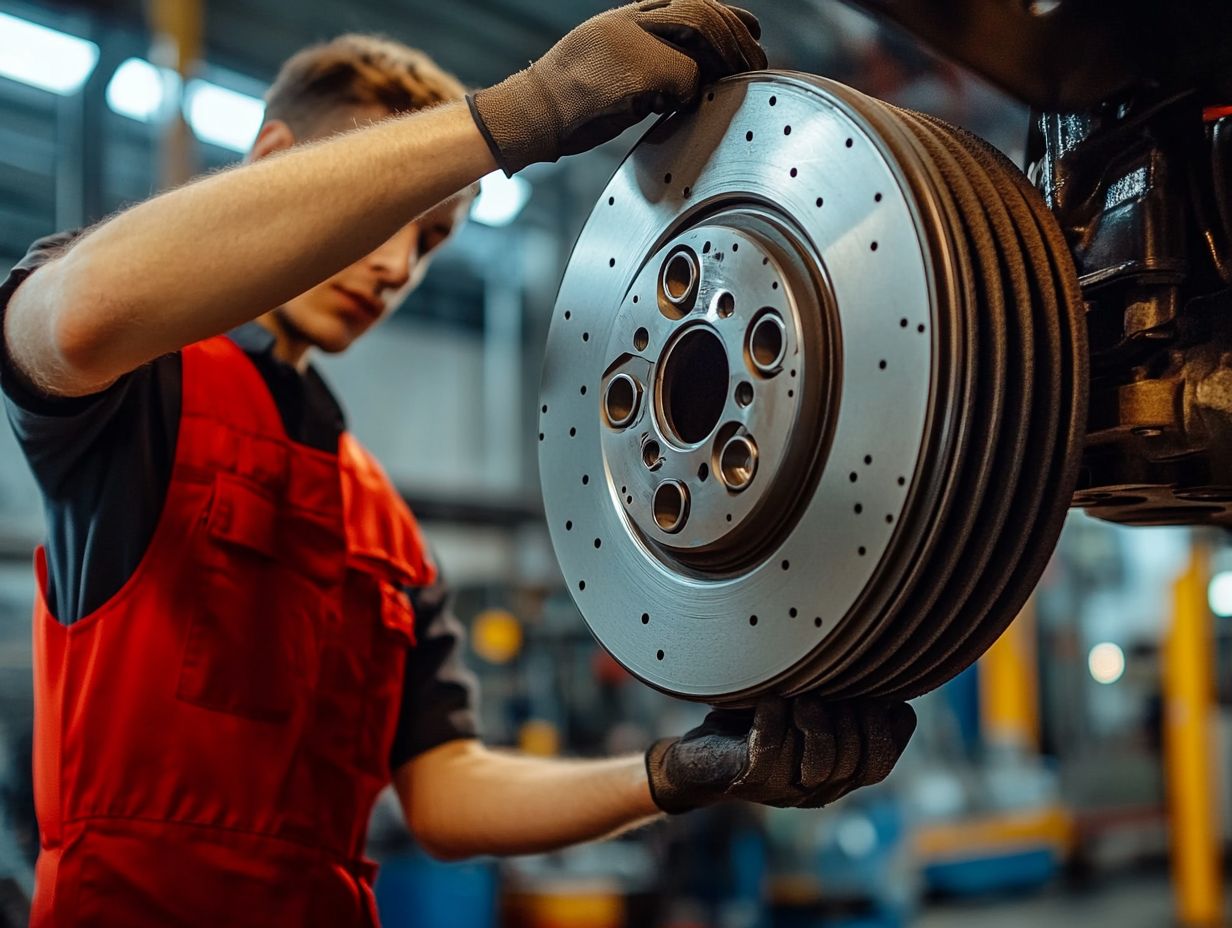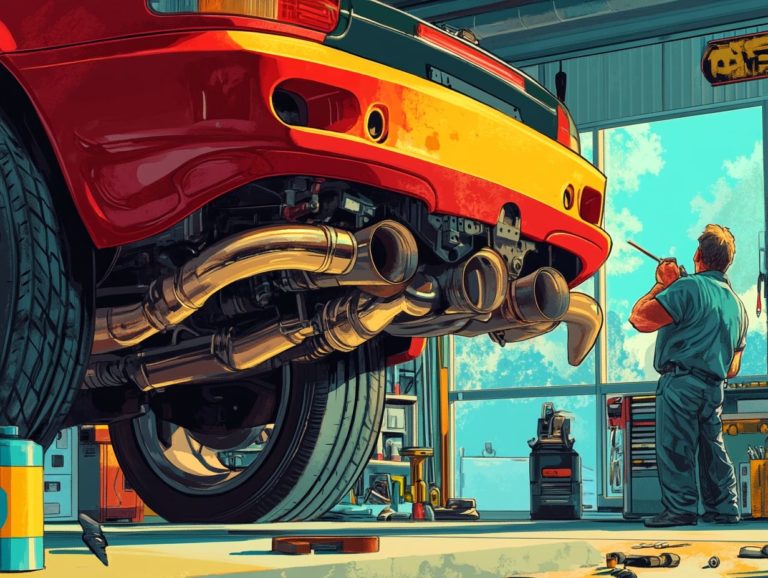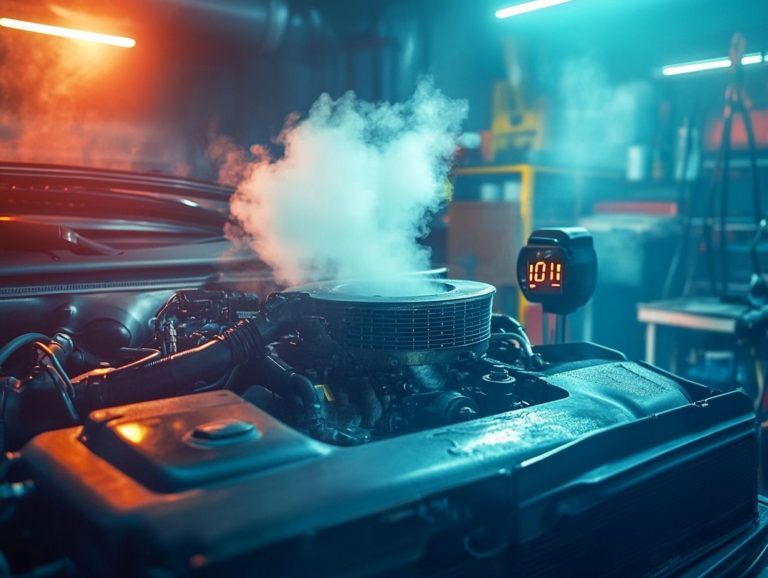What Are the Benefits of Regular Brake Inspections?
Having safe and reliable brakes is essential for every driver, yet many tend to overlook regular inspections until it s too late.
This article delves into the importance of routine brake evaluations, shedding light on the warning signs that suggest your brakes may require immediate attention.
You ll discover the numerous benefits of regular inspections not just for your safety but also for your wallet.
Find out how frequently you should have your brakes checked, what to anticipate during an inspection, and how to select a trustworthy service provider.
Don t wait! Keep your vehicle safe and ready for the road!
Contents
- Key Takeaways:
- Signs that Your Brakes Need Inspection
- Benefits of Regular Brake Inspections
- How Often Should You Get Your Brakes Inspected?
- What Happens During a Brake Inspection?
- How to Choose a Reliable Brake Inspection Service
- Frequently Asked Questions
- Why should you care about regular brake inspections?
- How often should I have my brakes inspected?
- What are some signs that my brakes may need to be inspected?
- Will regular brake inspections improve my vehicle’s performance?
- Can regular brake inspections save me money in the long run?
- What should I expect during a brake inspection?
Key Takeaways:

- Regular brake inspections ensure safety and prevent accidents by identifying and addressing potential issues before they become major problems.
- By catching and addressing brake issues early, regular inspections can save you money in the long run by preventing costly repairs or replacements.
- It is recommended to get your brakes inspected at least once a year or more frequently if you notice any warning signs such as squeaking or grinding noises.
Why Regular Inspections are Important
Regular inspections of your vehicle’s brake system are crucial for ensuring best braking performance and maintaining your overall safety on the road.
Neglecting brake checks can lead to significant issues, such as decreased braking efficiency and skyrocketing repair costs, ultimately compromising your driving experience.
By prioritizing brake service and sticking to a routine maintenance schedule, you prolong the lifespan of essential brake components and enhance your peace of mind while driving.
Timely inspections help you spot common signs of brake issues before they escalate into serious problems, ensuring a safer and more efficient driving experience.
This proactive approach not only protects you and your passengers but also contributes to the safety of everyone else on the road.
Brake inspections can uncover worn pads (brake components that can wear down over time, affecting braking ability), fluid leaks (loss of brake fluid can reduce braking efficiency), or malfunctioning lines (brake lines that do not work correctly), which, if ignored, may lead to catastrophic failures while driving.
Regular maintenance checks by qualified professionals allow for the adjustment and replacement of parts before they become critical, ensuring that your vehicle s braking system operates at peak efficiency.
Many automotive service centers provide comprehensive brake services that include diagnostics, pad replacements, and fluid flushes, all essential for optimal performance and reliability.
Investing in these services isn t just about ticking off a compliance box; it s about taking responsible action to prevent accidents and enhance your vehicular safety.
Signs that Your Brakes Need Inspection
Understanding the key signs that indicate your brakes require inspection is essential for ensuring both vehicle safety and best braking performance.
Overlooking these symptoms can lead to serious brake problems that jeopardize not only your driving experience but also your safety on the road.
Look out for indicators such as unusual grinding noises, vibrations when you press the brake pedal, or a brake warning light illuminating on your dashboard.
Keep an eye on brake fluid levels and assess for excessive wear, which are critical steps to ensure that your brake components are operating as they should.
Common Warning Signs
Common warning signs that your brakes may need inspection include the brake warning light lighting up on your dashboard and unusual grinding sounds when you apply the brake pedal. You might also notice noticeable vibrations during braking.
If you see low brake fluid levels, that could indicate underlying issues within the brake system, such as brake pads that are too thin or damaged rotors. This can significantly impact your vehicle’s braking performance.
Recognizing these symptoms early can help you avoid more extensive brake repairs later, ultimately saving you both time and money. For example, if you hear a grinding noise, it often means that the brake pads are too thin, risking damage to the rotors.
This not only diminishes your braking efficiency but could also lead to expensive rotor replacements if left unchecked. Similarly, if you experience vibrations while braking, it could suggest uneven wear or warped rotors, undermining both braking effectiveness and driver safety.
Keeping an eye on your brake fluid levels is crucial. A drop may indicate potential leaks or air in the brake lines, which can lead to serious braking problems if ignored. Act on these warning signs now to boost your driving experience and keep yourself safe!
Benefits of Regular Brake Inspections
Regular brake inspections provide a wealth of benefits that greatly enhance both the safety and performance of your vehicle, as outlined in what are the benefits of regular vehicle inspections, offering you the peace of mind you deserve.
First and foremost, these thorough inspections allow you to pinpoint potential brake issues before they snowball into costly repairs, ultimately saving you a significant amount of money.
Routine maintenance ensures that your brake system operates at peak efficiency and extends the lifespan of critical components like brake pads and rotors. This helps to preserve your vehicle s overall value.
Improved braking performance leads to a safer driving experience, significantly lowering the risk of accidents.
Ensuring Safety and Preventing Accidents

Ensuring the safety of your vehicle through regular brake inspections is essential for preventing accidents and enhancing your overall driving experience. A well-functioning brake system is critical for your safety on the road, as it directly impacts your braking efficiency during those crucial moments.
Neglecting brake maintenance can lead to diminished performance, significantly increasing the risk of sudden stops or a loss of control. If you often drive in varying conditions, such as inclement weather or heavy traffic, maintaining proper brake functionality becomes even more vital.
Regular inspections identify wear and tear and ensure that components like pads, rotors, and fluid are in optimal condition. This approach helps you react quickly and safely when it counts.
By investing time in routine brake checks, you enhance not just your safety but also that of everyone else on the road, contributing to a more reliable and enjoyable driving experience.
Cost Savings in the Long Run
Investing in regular brake inspections can lead to significant cost savings over time by preventing the need for more extensive repairs.
By identifying wear and tear before they escalate, you not only safeguard your safety but also protect your wallet. A well-maintained braking system reduces the chances of rotor damage and fluid leaks, which can be far more expensive to fix.
Keeping brake components in check also enhances your fuel efficiency, as a properly functioning braking system minimizes unnecessary drag on your vehicle.
Ultimately, committing to routine brake maintenance elevates your overall vehicle performance, ensuring that your expenses remain manageable and unexpected financial burdens are kept at bay.
With proactive care, maintaining your vehicle’s braking system becomes an investment in durability and reliability, granting you financial peace of mind.
Don t wait schedule your brake inspection today to ensure your safety and performance!
How Often Should You Get Your Brakes Inspected?
Determining how often you should get your brakes inspected hinges on several factors, including your driving habits, the type of vehicle you own, and advice from brake technicians. Schedule brake inspections at least once a year or every 12,000 miles. Choose whichever comes first.
If you drive in heavy traffic, increase the frequency of inspections. Navigating rough terrain or regularly hauling heavy loads also necessitates more frequent checks to ensure optimal performance and safety. Keeping an eye on your brakes lifespan is crucial for maintaining your vehicle’s value and minimizing potential repair costs down the line.
Recommended Frequency
The recommended frequency for brake inspections can vary. A good rule of thumb is to have your brakes checked at least once a year or every 12,000 miles to keep them in prime condition.
If you find yourself driving in harsh conditions think heavy traffic or steep terrain you may need to increase inspections to enhance your driving experience.
If you re behind the wheel of a heavier vehicle like a truck or an SUV, pay extra attention to your brakes. The added weight puts strain on the braking system, leading to faster wear. On the other hand, if you mostly cruise along smooth highways, your brakes might last longer.
Regardless of your vehicle type or driving environment, regular brake checks are very important. Check your brakes regularly! It not only extends their lifespan but also keeps you safe from unexpected failures that could jeopardize your safety.
What Happens During a Brake Inspection?
During a brake inspection, a qualified brake technician conducts a thorough evaluation of the parts of the brake system, ensuring everything operates as it should.
This involves a meticulous examination of the brake pads, rotors, brake calipers (which press the brake pads against the rotors), and brake fluid levels. The inspection typically starts with a visual assessment, followed by an in-depth analysis of each component s performance and efficiency. This comprehensive approach helps identify any potential brake issues that may need your attention or prompt repair services.
Steps and Procedures
A brake inspection involves checking key components to ensure your safety. The steps typically begin with a thorough visual examination of the brake components, followed by meticulous assessments of brake fluid levels, brake pads, and rotors.
Technicians start by looking for visible signs of wear, such as cracks or thinning in the brake pads. This check is crucial! Worn brake pads can greatly reduce your stopping power, putting you at risk.
Next, inspectors will scrutinize the rotors for any signs of warping or uneven wear; these issues can impact your overall braking efficiency and cause vibrations when you apply the brakes.
The brake fluid, essential for hydraulic brake systems, will be tested for moisture content and contamination, as degraded fluid can jeopardize your safety. By carefully evaluating these components, technicians not only enhance your vehicle’s braking capability but also prioritize your safety on the road, ensuring that every journey you undertake is as secure as possible.
How to Choose a Reliable Brake Inspection Service
Selecting a reliable brake inspection service is essential for guaranteeing that your vehicle receives top-notch maintenance and repair support. As you evaluate your options, consider the reputation of the mechanics, the variety of services available, and customer feedback.
Consider trusted local options like Community Automotive Repair or Buckeye Complete Auto Care for reliable services today! They are known for providing trustworthy brake inspections and repairs. This way, you can ensure that your vehicle stays safe and performs efficiently on the road.
Factors to Consider
When looking for a reliable brake inspection service, consider a few key factors.
First, check the qualifications of the brake mechanics. Their expertise, certifications, and training impact the quality of your inspection.
Next, consider the range of services offered. A shop with diverse services can handle everything from routine checks to complex repairs.
Don t underestimate the value of customer reviews. They provide insights into a shop s reliability and customer service.
Learn about community automotive services in your area, like Ice Cold Air and Dowdy s Auto.
Weigh these factors to make an informed decision. This way, your vehicle gets top-notch brake care.
Frequently Asked Questions
Why should you care about regular brake inspections?
Regular brake inspections can help ensure the safety of your vehicle and prevent costly repairs in the future.
How often should I have my brakes inspected?
It is recommended to have your brakes inspected at least every 6 months or every 6,000 miles, whichever comes first.
What are some signs that my brakes may need to be inspected?
Some signs that your brakes may need to be inspected include squeaking or grinding noises, a pulsating brake pedal, or a longer stopping distance.
Will regular brake inspections improve my vehicle’s performance?
Yes, regular brake inspections can improve your vehicle’s performance by ensuring that your brakes are working effectively and efficiently.
Can regular brake inspections save me money in the long run?
Yes, regular brake inspections can save you money in the long run by catching any potential issues early before they turn into larger and more expensive problems.
What should I expect during a brake inspection?
During a brake inspection, a technician will check the condition of your brake pads, rotors, calipers, and brake fluid levels. They will also look for any signs of wear or damage and make recommendations for any necessary repairs or replacements.







